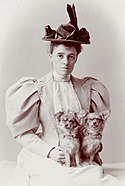Edith Wharton Quote
Little by little it became the scene of his real life, of his only rational activities; thither he brought the books he read, the ideas and feelings which nourished him, his judgments and his visions. Outside it, in the scene of his actual life, he moved with a growing sense of unreality and insufficiency, blundering against familiar prejudices and traditional points of view as an absent-minded man goes on bumping into the furniture of his own room. Absent- that was what he was: so absent from everything most densely real and near to those about him that it sometimes startled him to find they still imagined he was there.
Edith Wharton
Little by little it became the scene of his real life, of his only rational activities; thither he brought the books he read, the ideas and feelings which nourished him, his judgments and his visions. Outside it, in the scene of his actual life, he moved with a growing sense of unreality and insufficiency, blundering against familiar prejudices and traditional points of view as an absent-minded man goes on bumping into the furniture of his own room. Absent- that was what he was: so absent from everything most densely real and near to those about him that it sometimes startled him to find they still imagined he was there.
Related Quotes
About Edith Wharton
Edith Wharton (; born Edith Newbold Jones; January 24, 1862 – August 11, 1937) was an American writer and designer. Wharton drew upon her insider's knowledge of the upper-class New York "aristocracy" to portray realistically the lives and morals of the Gilded Age. In 1921, she became the first woman to win the Pulitzer Prize in Fiction, for her novel The Age of Innocence. She was inducted into the National Women's Hall of Fame in 1996. Among her other well known works are The House of Mirth, the novella Ethan Frome, and several notable ghost stories.
